180th Anniversary Ceremony
Many speakers congratulated the TU Chemnitz on its important birthday – guests of the AC21 International Forum also took part in the celebration
-
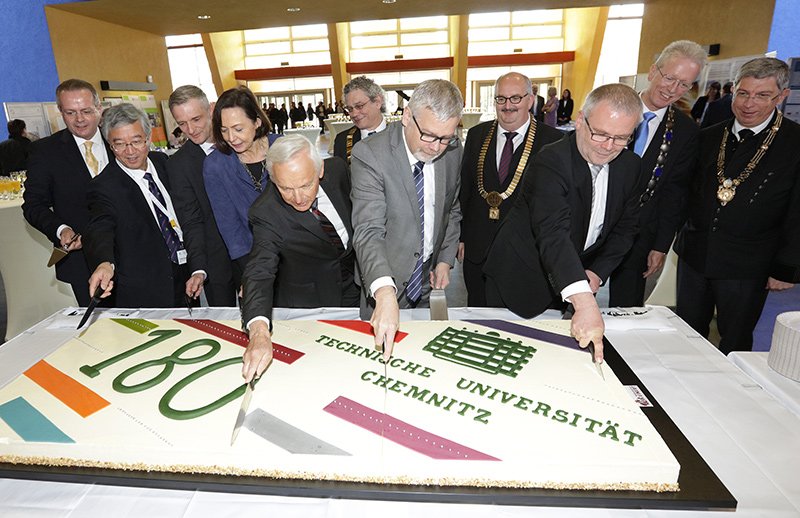
Cutting the anniversary cake: ceremony speakers and other honored guests divided the 180 centimeter long cake during the champagne reception for all guests. Photo: Jacob Müller -
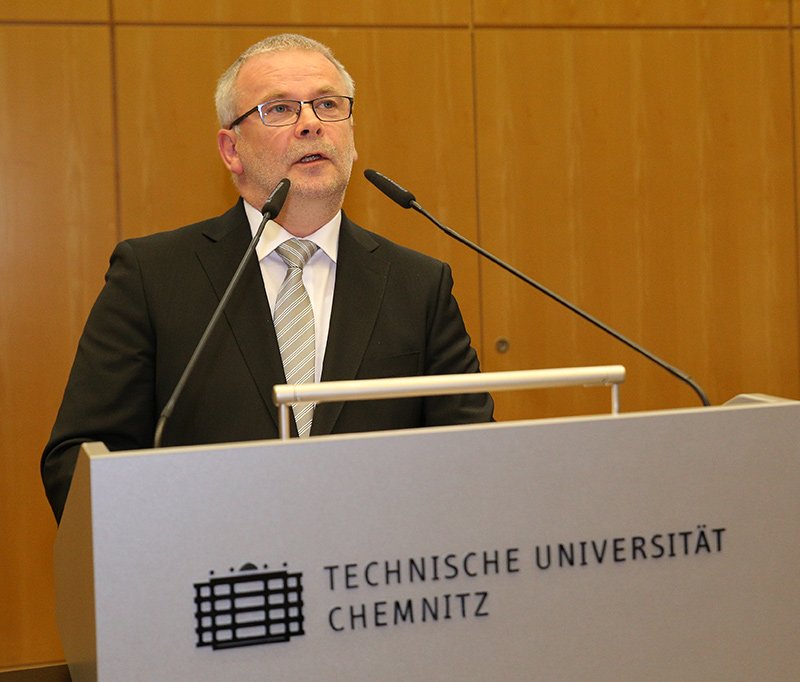
“The TU Chemnitz today represents cutting-edge research and research competencies along the entire value creation chain,” said Prof. Dr. Andreas Schubert, Acting Rector, and closed with the words: “May the TU Chemnitz’s networks be long-lasting and endure so that it may be effective and successful over the next 180 years.” Photo: Steve Conrad -
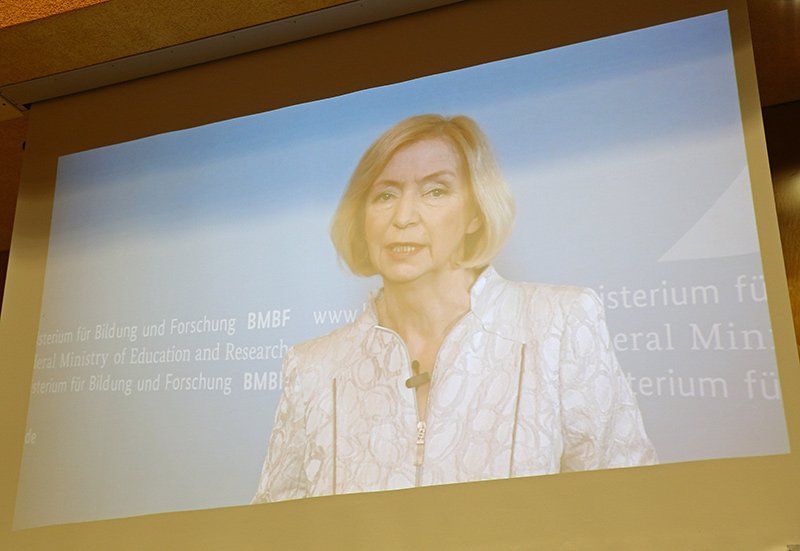
Prof. Dr. Johanna Wanka, German Federal Minister of Education and Research: “It is important that Germany is a county open to the world and that it makes this clear to all students and guest lecturers and young doctoral candidates from all over the world. This is what the university in Chemnitz stands for.” Photo: Steve Conrad -
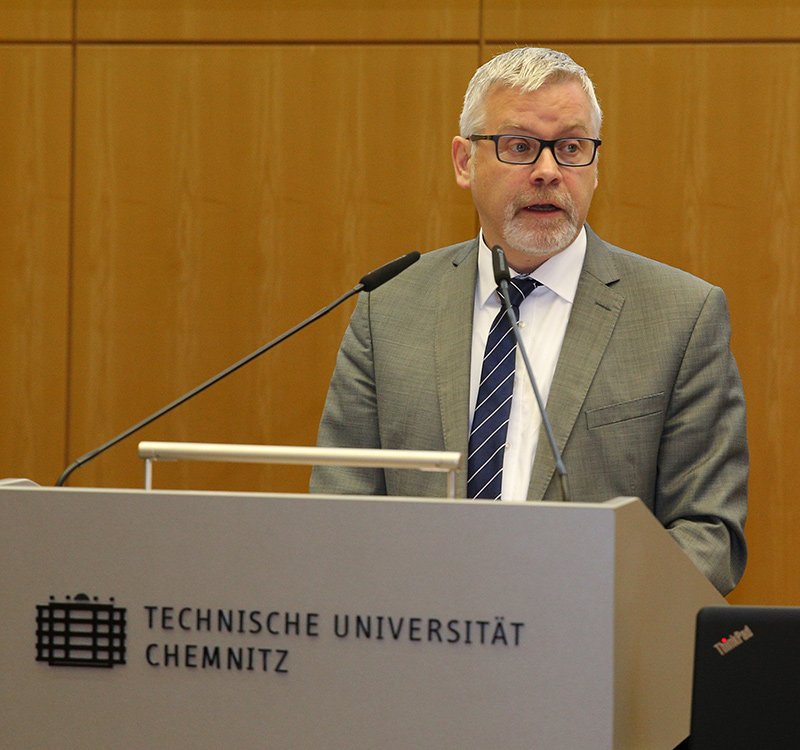
Dr. Uwe Gaul, State Secretary of the Saxon State Ministry of Science and the Arts: “Today, the TU Chemnitz offers excellent conditions for success in academia and excellent research.” Photo: Steve Conrad -
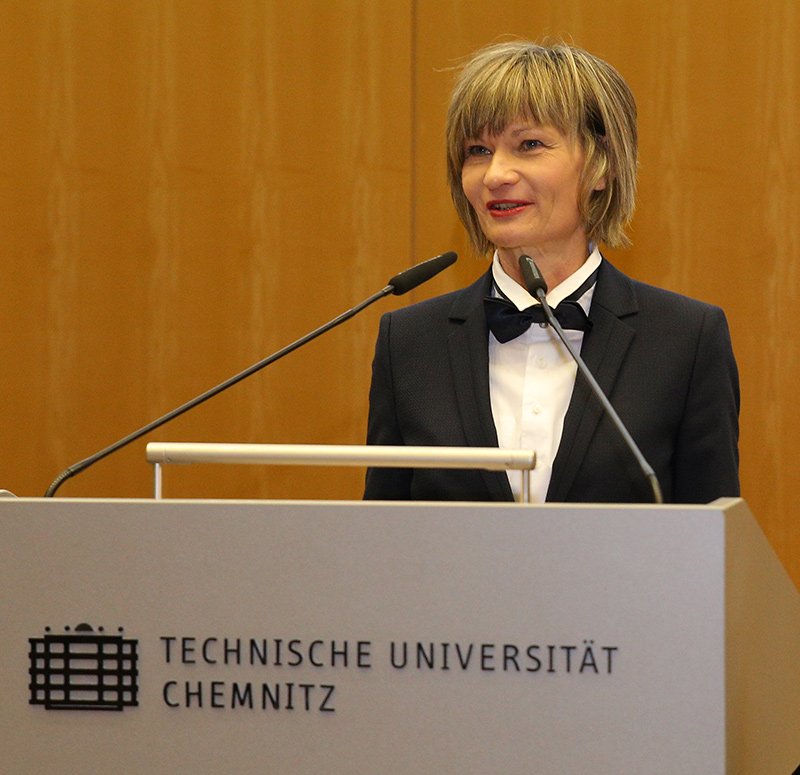
Mayor Barbara Ludwig said: “Celebrating is one thing – and we can do that too. The other thing is, we must create and think ahead – that is what we are really good at.” And she said that it should therefore be obvious, that the AC21 International Forum is embedded in the anniversary celebrations. Photo: Steve Conrad -
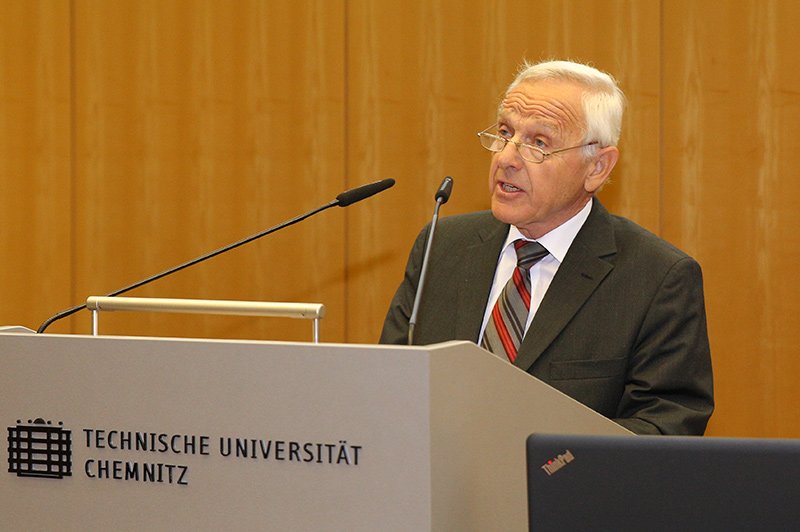
Dr. Peter Seifert, Chair of the University Council, highlighted the important role of the university in the regional job market and community life in the city and region. Photo: Steve Conrad -
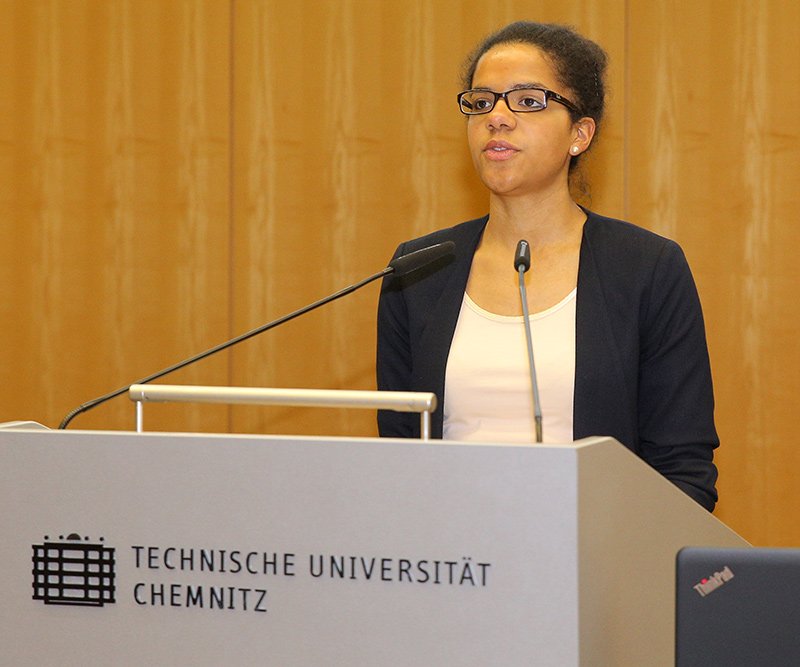
Student Yvonne Pajonk explained how she also benefits from the university’s networks: Through the TU’s many international contacts she was able to spend a semester abroad in Spain and as a recipient of the Deutschlandstipendium scholarship, she has the opportunity to engage in volunteer work. Photo: Steve Conrad -
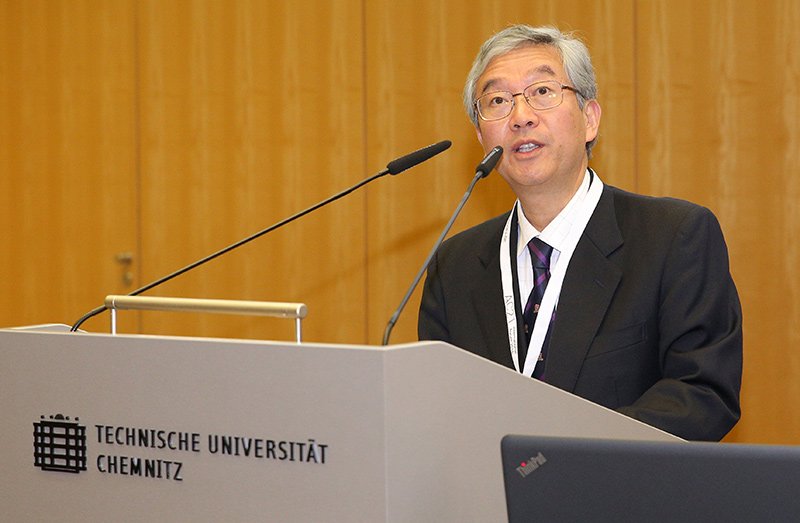
Prof. Dr. Yoshihito Watanabe, Vice-President of Research and International Planning at Nagoya University and Director of the AC21 General Secretariat, thanked the university for the great hospitality with which it has accommodated participants of the International Forum. Photo: Steve Conrad -
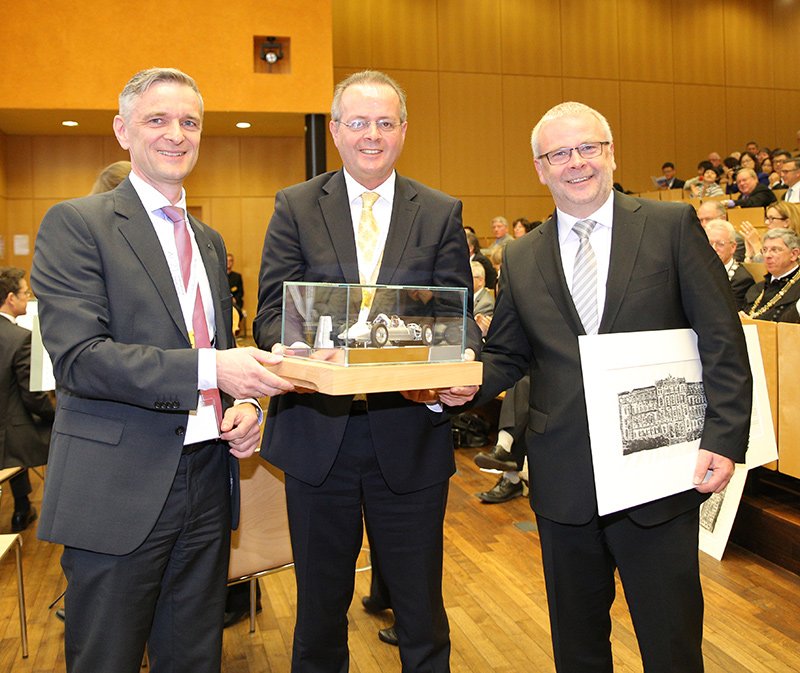
Eberhard Alles, TU Chancellor and Coordinator of the AC21 International Forum in Chemnitz, thanked all participants of the forum who traveled to Chemnitz and highlighted the enthusiasm of the members of the international university network. Photo: Steve Conrad -
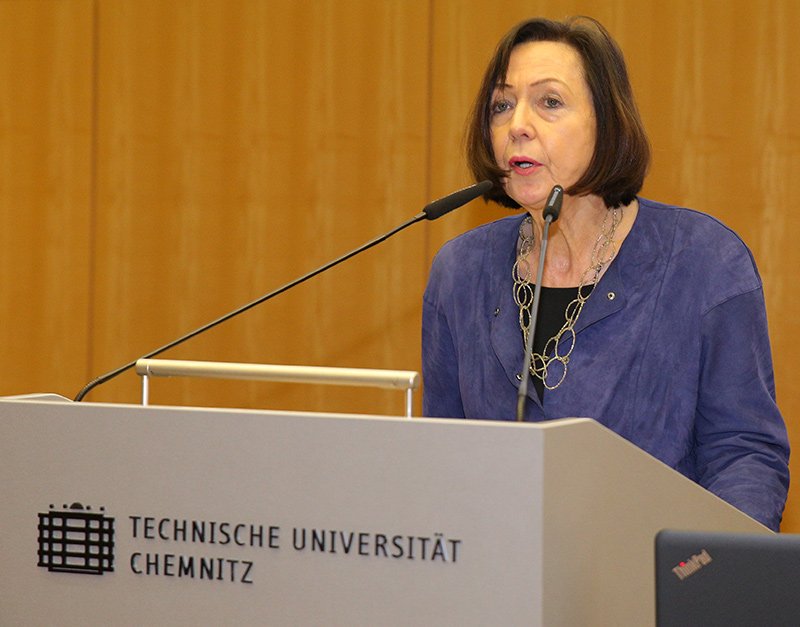
Prof. Dr. Margret Wintermantel, President of the German Academic Exchange Service (DAAD), named two goals that her institution and the federal government hopes to achieve by the year 2020: Firstly, raising the number of international students at German universities from 320,000 in 2015 to 350,000. Secondly, increasing the percentage of German students who gain experience abroad from the current 37% to 50%. Photo: Steve Conrad -
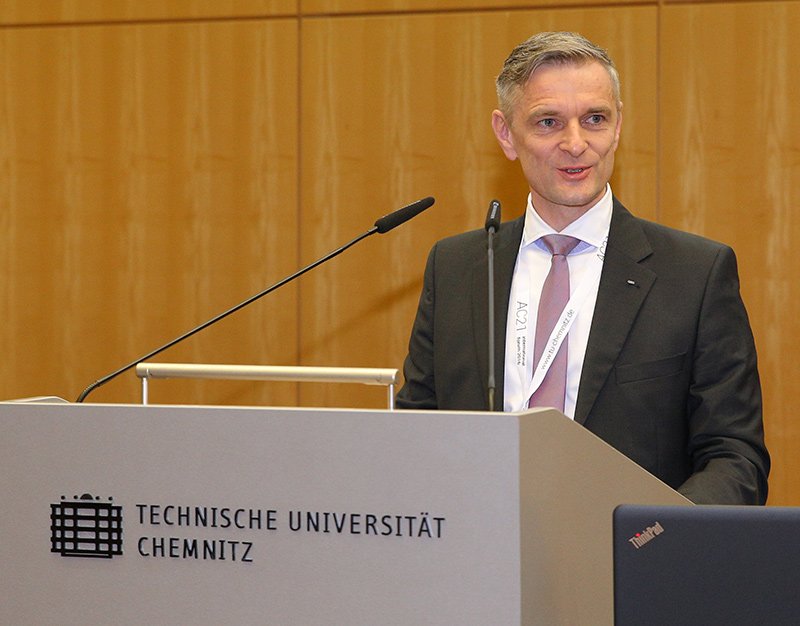
Dr. Michael Korte, Head of Pre-development of Vehicle Concepts at AUDI AG Ingolstadt, underlined that success in the past is certainly a good thing, but what really matters is working on innovations in order to shape the future. In this spirit, he congratulated the TU Chemnitz not only on its anniversary, but also wished all the best for the next 180 years. Photo: Steve Conrad -
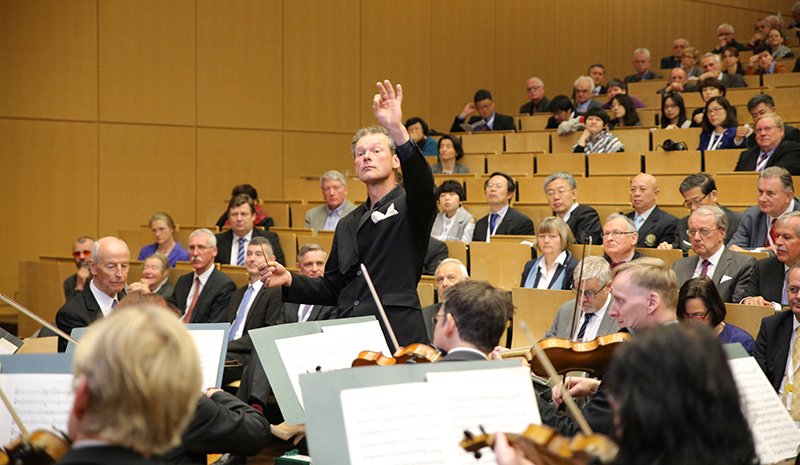
The university orchestra Collegium musicum played under the direction of Michael Scheitzbach. Photo: Steve Conrad
As the Königliche Gewerbschule zu Chemnitz was founded on May 2, 1836, only 14 students began their education. Today – 180 years later – almost 12,000 students study in Chemnitz. Around 450 guests attended the Anniversary Ceremony on May 2, 2016. Among them were approximately 100 participants of the “AC21 International Forum”, the largest and most important event of the “Academic Consortium for the 21st Century” network, held at the TU Chemnitz until May 3. The theme of this international event is “Networks of innovation for the transformation of society through science”. Therefore, the Anniversary Ceremony, which served to kick off the scientific program of the AC21 Conference at the same time, was a symbol of these networks.
Prof. Dr. Andreas Schubert, Acting Rector of the TU Chemnitz, opened the ceremony and gave a look back on the historical development of the university in his welcome address. “The TU Chemnitz has distinguished itself in a targeted fashion,” said the Rector and discussed the university’s strong interdisciplinarity along with its three core competencies. Networking with national as well as international partners plays an important role.
Prof. Dr. Johanna Wanka, German Federal Minister of Education and Research, addressed the ceremony guests in a video message: “In Germany, we have a great interest in internationalizing our academic landscape and we are delighted to be the third most popular country for students in the world.” Nationwide, around eleven percent of students are from abroad. “At the university in Chemnitz, you are far beyond this mark – around 20% of the students here are from abroad. This is a great achievement!”
Dr. Uwe Gaul, State Secretary of the Saxon State Ministry of Science and the Arts, conveyed congratulations from the Science Minister Dr. Eva-Maria Stange. He noted – particularly with the Federal Cluster of Excellence MERGE in mind – that the TU Chemnitz is “an important partner not only in the Free State of Saxony and in the German academic landscape, but also beyond these borders.” The State Secretary emphasized: “We will keep our fingers crossed for the TU Chemnitz’s application in the coming round of the German Universities Excellence Initiative. We, the Ministry, want to be your partner in this!”
Mayor Barbara Ludwig congratulated not only the university but also the city and region on 180 years of TU Chemnitz. Addressed particularly to the Saxon State Ministry of Science and the Arts, the mayor said: “If you want the city and region to continue to grow as well as it has, then do one thing above all else: as much as possible for the university.” She said that knowledge is the resource that sets this region and city apart.
Dr. Peter Seifert, Chair of the University Council, estimated that the university today has achieved a level of development like never before. He stressed that is important to appreciate the value of all faculties and specialties that are represented at the TU, even if the university’s strengths traditionally lie in the engineering sciences: “Precisely the humanities and social sciences are indispensable initiators for the city and the region.”
Yvonne Pajonk, intercultural communications student at the TU Chemnitz since 2013 and recipient of the Deutschlandstipendium scholarship, thanked the university on behalf of all students “for the opportunities and prospects for the future that you provide us through education and research,” as well as for the networks from students can benefit. Of particular focus in her speech was the 100th anniversary of women studying at the university, which the TU is also celebrating this year.
Prof. Dr. Yoshihito Watanabe, Vice-President of Research and International Planning at Nagoya University and Director of the AC21 General Secretariat, thanked the TU for involving the AC21 International Forum in the University’s Festival Week. He underscored the meaning of networks in today’s fast-paced world. In strong networks, it is possible to achieve “great results in a short amount of time”.
TU Chancellor Eberhard Alles gave an overview of the conference as Coordinator of the AC21 International Forum in Chemnitz. “The AC21 International Forum has the potential to become an important event in the history of AC21,” said the Chancellor after recalling past network events that the TU Chemnitz has hosted – including the Student World Forum 2009 and a two-day “Special Project Fund” workshop from AC21 in 2015.
Prof. Dr. Margret Wintermantel, President of the German Academic Exchange Service (DAAD) spoke in her ceremony address about the internationalization of universities and highlighted that efforts toward internationalizing the academic landscape have been considerably intensified over the years. She named contributing factors such as global competition among educational institutions, demographic changes and the corresponding race for talented individuals, new forms of teaching including new media as well as the need to prepare students for a globalized world.
Dr. Michael Korte, Head of Pre-development of Vehicle Concepts at AUDI AG Ingolstadt and graduate of the TU Chemnitz also addressed the audience. “Networks between industry and the academic world are an important key for success.” He specifically referenced the cooperative research conducted by his company with the Federal Cluster of Excellence MERGE at the TU Chemnitz. Here, the focus is on domains such as the development of new materials.
The ceremony was musically embellished by the collegium musicum e.V. university orchestra. Following the event held in the university’s largest lecture hall, guests could raise a toast to the university and enjoy a piece of anniversary cake. In the foyer of the lecture hall building, various exhibitions from TU faculties and central institutions gave a glimpse at the Technische Univeristät Chemnitz’s current progress and developments.
The TU Chemnitz would like to express its gratitude to AUDI AG, premium sponsor of the Festival Week and the “AC 21 International Forum” as well as all other supporters.
More information about the Festival Week 180 Years of TU Chemnitz: www.mytuc.org/thyk
(Translation: Sarah Wilson)
Katharina Thehos
03.05.2016
- Naturwissenschaften
- , Mathematik
- , Maschinenbau
- , Elektrotechnik und Informationstechnik
- , Informatik
- , Wirtschaftswissenschaften
- , Philosophische Fakultät
- , Human- und Sozialwissenschaften
- , Universitätsrechenzentrum
- , Universitätsbibliothek
- , Zentrum für Lehrkräftebildung und Bildungsforschung
- , Studierende
- , International
- , Wirtschaft
- , Freunde
- , Historie




